In July, Marine Corps Gen. Thomas D. Waldhauser officially took over command of the United States Africa Command, known as AFRICOM, from retiring Army Gen. David Rodriguez. Waldhauser inherits an organization that has overcome initial growing pains and turned into an integral player in responding to African security challenges. Although the U.S. maintains only one official base on the continent, as many as 60 smaller facilities sprawl across 34 African nations. These facilities serve as staging areas for a steadily growing array of joint special force operations, military exercises and other security cooperation activities. Under Rodriguez’s three-year tenure, AFRICOM took its response to the spread of Islamist extremism across the continent to another level, conducting massive airstrikes on al-Shabab training camps in Somalia and building a drone base in Cameroon to aid in the fight against Boko Haram.
Nevertheless, it is far from clear that AFRICOM is succeeding in meeting its longer-term objectives of deterring transnational threats and promoting regional security and stability. In its efforts to combat extremism, the U.S. has fostered close partnerships with some of the continent’s most repressive authoritarian regimes. Likewise, U.S. attempts to support democratization and aid fragile democracies have at times contributed to further upheaval and abetted extremist groups. AFRICOM’s expanding mandate is dogged by the reality that the relationship between combating terrorism, safeguarding national interests and fostering political stability is not always clear.
A central priority for AFRICOM going forward should be to consider better ways to balance these competing interests. To start, AFRICOM should be more active in supporting armed forces that refrain from political interference and respect human rights; rethink its approach to assisting Africa’s most fragile states; and invest in the analytical capacity needed to better weigh the costs of engagement against the political risks.

